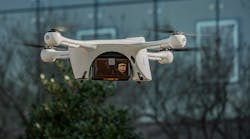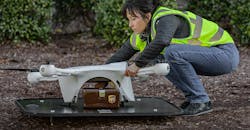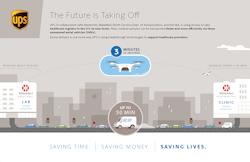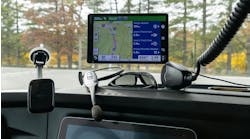UPS, well known in the U.S. for its seen-everywhere brown delivery trucks, made history on Monday with the “first Federal Aviation Administration (FAA)-sanctioned use of a drone for routine revenue flights involving the transport of a product under a contractual delivery agreement.”
According to the company, Monday’s flight was trip No. 1 for a new logistics service created to deliver medical samples via unmanned drones. It is being launched by UPS in collaboration with Matternet, a leader in autonomous drone technology.
The program is taking place at WakeMed’s flagship hospital and campus in the Raleigh, NC, metropolitan area, with oversight by the FAA and the North Carolina Department of Transportation (NCDOT). The landmark flight marked the beginning of numerous planned daily revenue flights on the campus.
“Drone transport will improve speed of deliveries at a lower cost, enhance access to care and create healthier communities,” observed Donald Gintzig, WakeMed president & CEO. “WakeMed is committed to innovation, and we believe drone technology has the potential to achieve transformational improvements in health and healthcare delivery.”
Here’s how it will work: During the WakeMed program, a medical professional will load a secure drone container with a medical sample or specimen, such as a blood sample, at one of WakeMed’s nearby facilities. The drone will fly along a predetermined flight path, monitored by a specially trained Remote Pilot-in-Command (RPIC), to a fixed landing pad at WakeMed’s main hospital and central pathology lab.
The program will utilize Matternet’s M2 quadcopter, which is powered by a rechargeable lithium-ion battery. It can carry payloads weighing up to about five pounds over distances of up to 12.5 miles. UPS and Matternet noted that they will use what they learn together at WakeMed to consider how drones can be applied to improve transport services at other hospitals and medical facilities across the U.S.
"Together with UPS, we aim to shift the status quo for on-demand logistics for healthcare systems in the U.S. through drone delivery networks,” said Aadreas Raptopoulos, CEO of Matternet. “Our technology allows hospital systems to transport medical items at an unprecedented level of speed and predictability, resulting in improved patient care and operational savings. We are excited to work with our partners to breathe new life into healthcare logistics, and help establish a new layer of ultra-fast, predictable transportation.”
Currently, most medical samples and specimens are transported across WakeMed’s expanding health system by courier cars. The addition of drone transport is expected to offer an option for on-demand and same-day delivery, the ability to avoid roadway delays, increase medical delivery efficiency, lower costs and improve the patient experience with potentially life-saving benefits.
“UPS Healthcare & Life Sciences is excited to expand on our current lab specimen logistics portfolio to drive step change in today’s delivery models,” said Chris Cassidy, UPS president of Global Healthcare & Life Sciences Strategy. “Using drones to bring blood and other diagnostic specimens from medical facilities to central labs will improve transport efficiencies like never before. And with fewer vehicles on the road, we’ll generate less environmental impact.”
This collaboration is not the first UPS program to utilize drone flights in support of healthcare logistics. UPS partnered with GAVI and Zipline in 2016 to deliver blood products to remote locations in Rwanda. And the Matternet team has already completed more than 3,000 flights for healthcare systems in Switzerland. In fact, Matternet was the first company in the world to be authorized for full operations of drone logistics networks over densely populated areas in Switzerland.
NCDOT supported Matternet in conducting first-round test flights using Matternet’s drone technology on WakeMed’s campus in August 2018 as part of the FAA’s Unmanned Aircraft System Integration Pilot Program (IPP). The three-year FAA program is intended to test practical applications of drones by partnering local governments with private sector companies to learn more about how this emerging technology can be safely and usefully integrated into day-to-day activities. The five IPP partners involved are the FAA, NCDOT, UPS, Matternet, and WakeMed.





